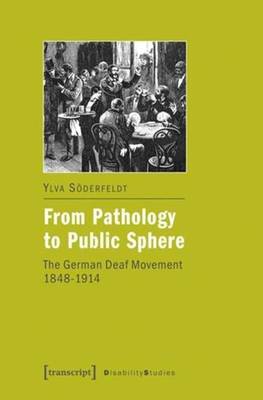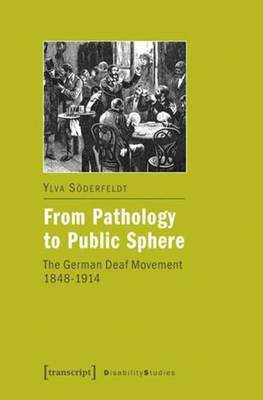
- Afhalen na 1 uur in een winkel met voorraad
- Gratis thuislevering in België vanaf € 30
- Ruim aanbod met 7 miljoen producten
- Afhalen na 1 uur in een winkel met voorraad
- Gratis thuislevering in België vanaf € 30
- Ruim aanbod met 7 miljoen producten
Zoeken
From Pathology to Public Sphere
The German Deaf Movement, 1848-1914
Ylva Söderfeldt
Paperback | Engels | Disability Studies: Körper - Macht - Differenz | Disability Studies. Körper - Macht - Differenz | nr. 9
€ 35,45
+ 70 punten
Omschrijving
In the late 19th century, the so-called German Method, which employed spoken language in deaf education, triumphed all over the Western world. At the same time as deaf German schoolchildren were taught to articulate and read lips, an emancipation movement of signing deaf adults emerged across the German Empire. This book tells the story of how deaf people moved from being isolated objects of administration or education, depending on welfare or working in the fields, to becoming an urban middle class collective with claims of self-determination. Main questions addressed in this first comprehensive work on one of the world's oldest movements of disabled people include how deaf organisations emerged, what they fought for, and who was left behind.
Specificaties
Betrokkenen
- Auteur(s):
- Uitgeverij:
Inhoud
- Aantal bladzijden:
- 316
- Taal:
- Engels
- Reeks:
- Reeksnummer:
- nr. 9
Eigenschappen
- Productcode (EAN):
- 9783837621198
- Verschijningsdatum:
- 5/01/2013
- Uitvoering:
- Paperback
- Formaat:
- Trade paperback (VS)
- Afmetingen:
- 147 mm x 226 mm
- Gewicht:
- 489 g

Alleen bij Standaard Boekhandel
+ 70 punten op je klantenkaart van Standaard Boekhandel
Beoordelingen
We publiceren alleen reviews die voldoen aan de voorwaarden voor reviews. Bekijk onze voorwaarden voor reviews.











